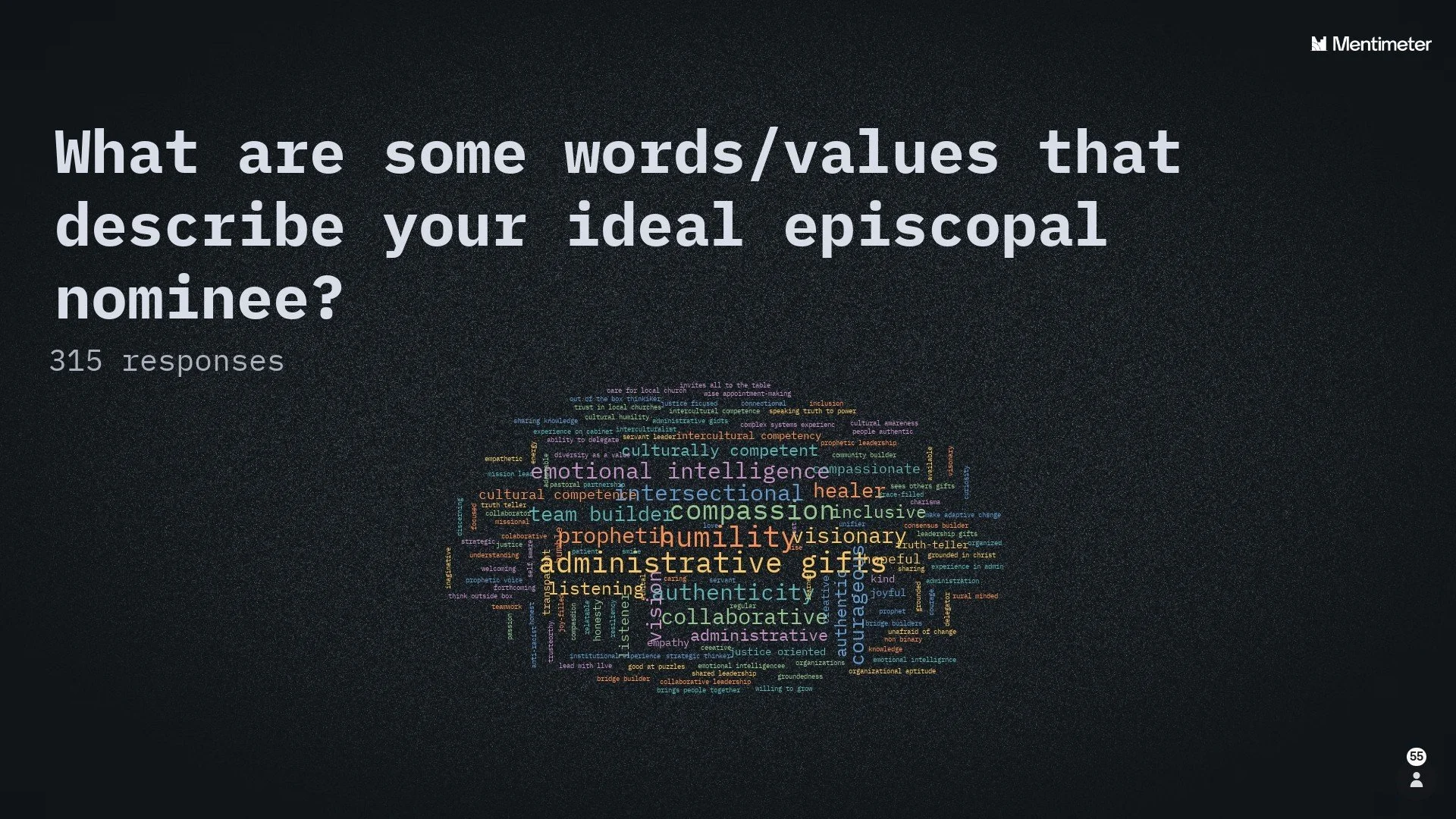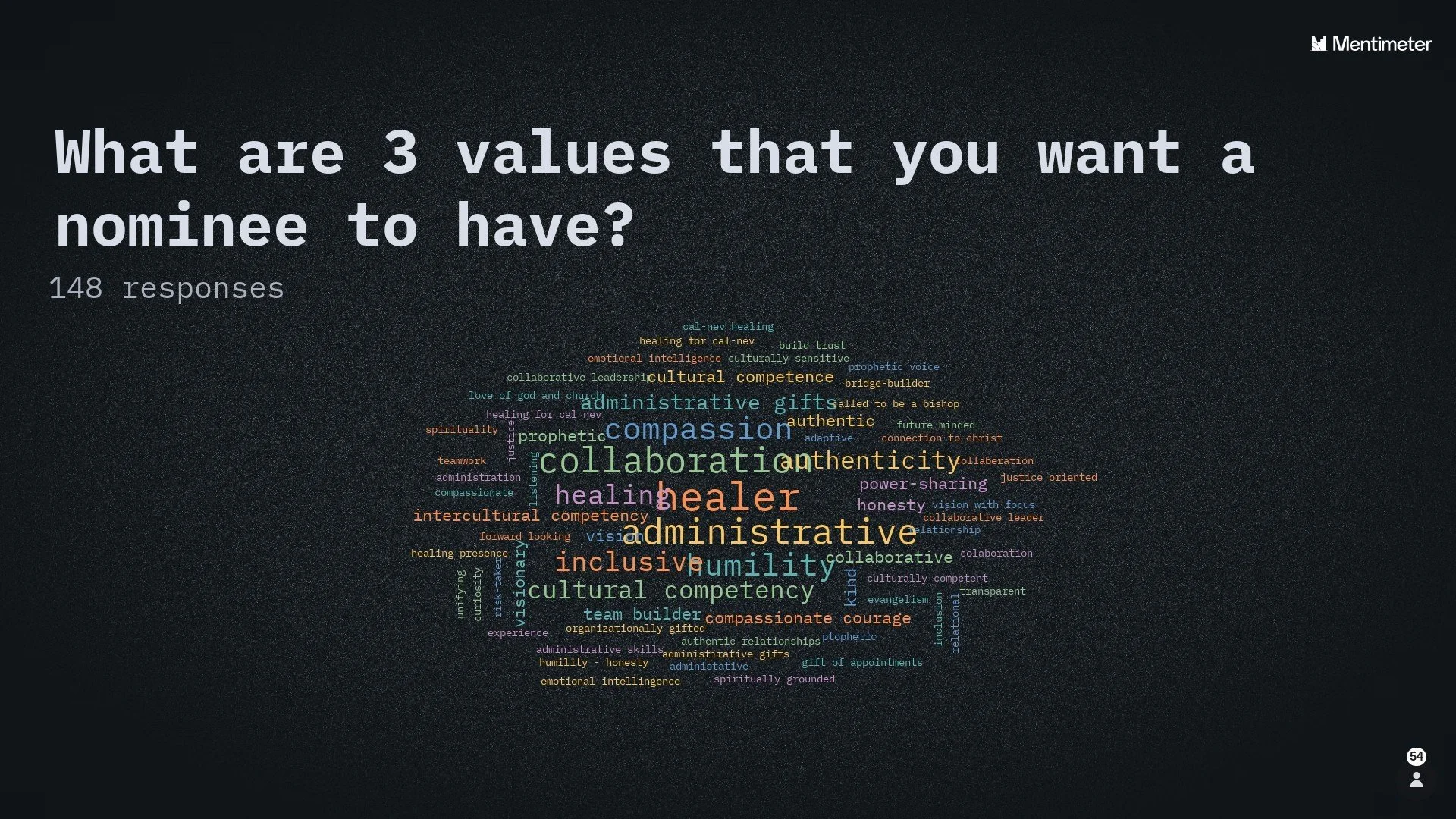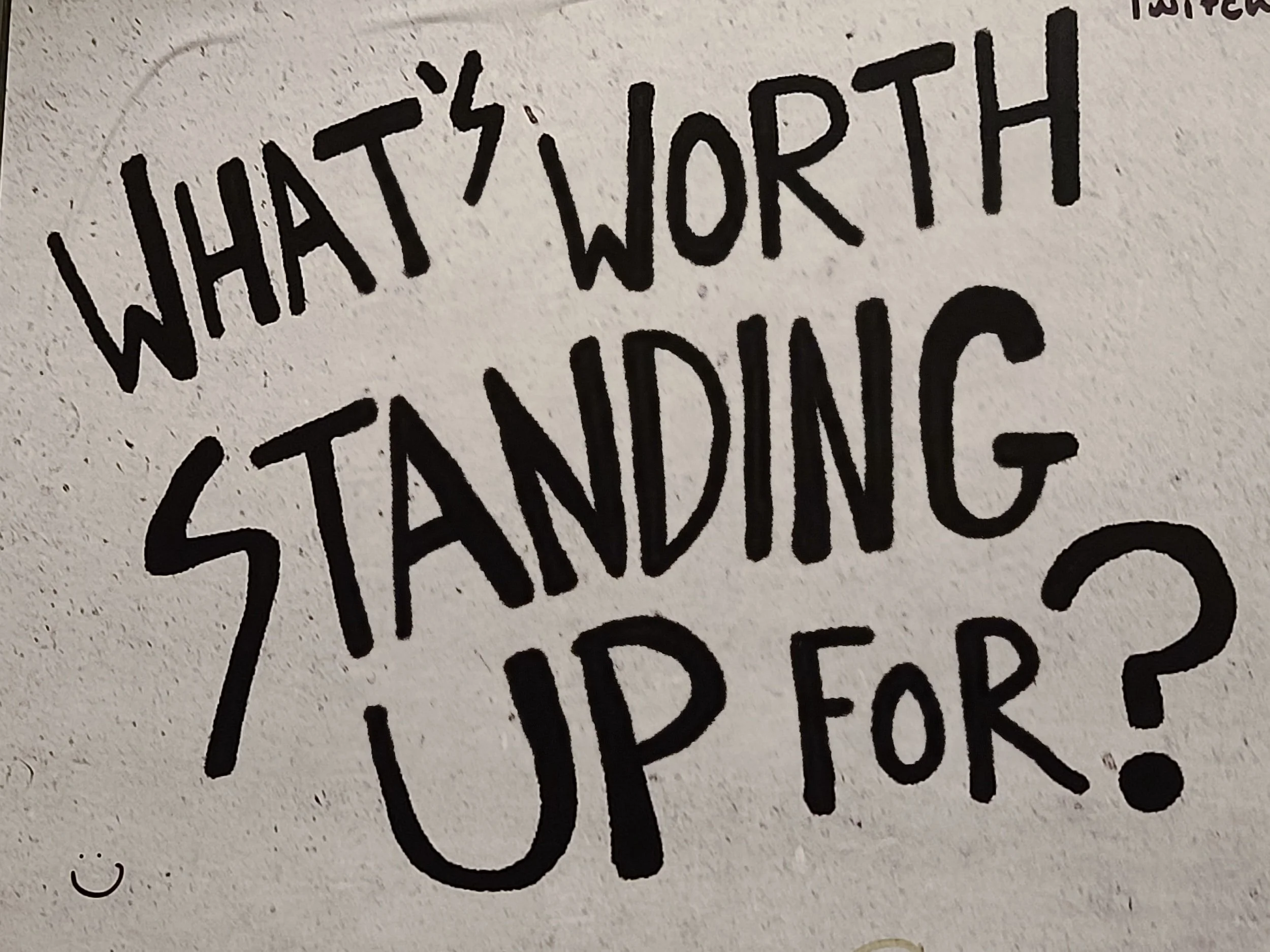On Sunday July 7, 2024 WMJM Held an online dialog session to discuss the values of Episcopal leadership and some of the questions people would like to ask candidates for bishop if they have the chance.
Here are some of the results of that conversation.
(Rather than spending time on fancy formatting, we’ve posted text as quickly as possible.)
These questions were highlighted by the conversation groups as key questions they have for episcopal candidates:
When have you tried to do something and it was wrong…how did you admit the error and correct it?
What three gifts do you bring to the table? Why are they important at this particular time?
How many languages do you speak? What are they? What do you do to become culturally competent and improve your cultural competency?
Describe the future of the church, especially in the West, as it embraces changes.
Knowing the jurisdiction has a growing Hispanic population, how will we grow Hispanic churches?
What are the joys and what are the new challenges coming out of the General Conference?
What’s the most complex leadership challenge that you’ve faced? What happened?
Tell us your experience of episcopal authority and how that would look under your leadership.
How have you provided care and/or leadership toward healing for a community/family/person recovering from a traumatic or difficult situation?
How do you see your role as bishop helping make sure regionalization is mostly about decolonization and not just about giving the US more autonomy?
How have you measured health in your ministry context, without using numbers?
How would you move the church beyond its survival instincts to face the jurisdiction's existential challenges? (I.e. climate change, Cal-Nev, housing crisis, decentering majority)
In addition, anyone attending the session could offer additional questions for episcopal candidates. Here is that list:
How have you handled division in previous places?
What is your vision for the changing role of the church and the larger community?
If you were assigned to our episcopal area, how would you get started? How will you get to know your new context?
How would you help clergy and churches launch an effective appointment?
How will you encourage curiosity and authentic relationships?
As you manage change, how do you work to include those who disagree with you?
What motivates you / drives you to want to be a bishop?
How do you imagine the role of the Bishop changing in the next 4-8 years? Relationship to the college, local churches, permeable boundaries, etc.
If you are assigned to Cal-Nev how would you begin the process of healing and rebuilding trust?
What is an example of a healing process you have led, and how did it go?
What 3 values would you bring to the episcopacy?
How will you address the pain that the UM church has been dealing with?
Cal Nev Conference and disaffiliation in specifics
How have you helped healing happen within high-level conflicts
How does the WJ lead in modeling an inclusive church without pushing out more conservative members?
How do you celebrate wins?
What do you think of when you think of California?
Share an example of a time when you’ve led a team through interpersonal conflict and harm and how you helped the team navigate to a collaborative and effective outcome.
Understanding the fast-growing Hispanic/Latinx population in the Western Jurisdiction, what is your gift to help with the establishment of new Hispanic/Latinx Faith Communities?
How do we keep regionalization from becoming something that is just for the benefit of the US? Regionalization - how will it work? What about costs? How do we keep from recreating a system that just repeats what we have just dismantled?
Tell us about a time you were in an intercultural setting and were surprised or uncomfortable about something that happened. How did you respond and what did you learn about yourself?
What is the role of a bishop in bringing about a more equitable institution that does ministry through an equity lens?
What is your involvement with the youth today? How do we reach young folks?
What is your sense of collaboration with the laity in the decision-making process?
How would you respond to a person, or persons, who had issues with your leadership and decisions?
How do you view administrative work? As a ministry? Do you enjoy it?
How do you demonstrate collaboration?
How will you speak out against Christian Nationalism and equip our churches for the fight?
Especially for younger candidates, how will you prioritize self-care as you consider the length of your potential episcopal service?
What is your connection/Relationship with the Hispanic/Latinx Community?
How have you empowered, supported, and encouraged: New and different programs or ministries? And new and differently gifted, differently-abled leaders?
What would be your guiding principles as you serve as Bishop?
How would you help set a collective and unified tone to bring people together across many differences in Annual Conferences?
How do you stay in love with Jesus?
What books or articles are you reading right now?
Who do you bring with you as you move into your role as Bishop?
How do you handle conflict? What is just resolution, and how do you achieve it? Conflict resolution strategies? Strategies for creation care? How to care for churches that are suffering?
What is your understanding of the vision of the church coming out of the General Conference and how do you inspire that to happen in concrete ways in your annual conference? And for the Western Jurisdiction?
What is heaviest on your heart in this jurisdiction at this time?
Please share any specific project/Ministry you have been involved with the Hispanic/Latinx Community in the Jurisdiction.
what systemic shifts would you be bringing to the Council of Bishops and your annual conference? What strategies have you considered given your extensive pastoral experience- long term?
What are your own spiritual practices? How do you care for body, mind, and soul?
How will you lead administrative functions in your area without micromanaging?
Who do you surround yourself with?
What strategies can you use as you enter each new context?
What are some strategies for bringing healing into spaces that are grieving or divided?
How would you approach being assigned to the San Francisco Episcopal area?
How do you rebuild trust?
Share a time when there was a high anxiety conflict where you stayed non-anxious.
These gifts aren't mutually exclusive, but do your strengths lean toward administration or visioning?
How will you facilitate healing in our community around racial, regional, and LGBTQIA+ healing?
How can the church use its resources to meet systemic social justice issues?
Name one or two places you would like to lead your conference.
What are your strengths in unity and diversity in your areas?
What is just resolution and process you use to achieve it when covenants are broken?
How would you bring wholeness and unity to ethnic congregations?
How do you use and/or share power in ministry?
What responsibilities will you plan to tackle yourself, and which ones do you prefer to delegate?
What do you do to center the most marginalized?
How will you help the jurisdiction work collaboratively across conference lines?
Note: questions have been merged and edited.
Episcopal Discernment —
Through a Social Justice Lens
As a gift to the Western Jurisdiction, WMJM gathered more than sixty people from across the Jurisdiction in a July 31, 2022 webinar to develop questions with a social justice focus for episcopal candidates. These questions can assist annual conference delegations and other groups to keep social justice concerns before episcopal candidates through the discernment process of electing new bishops this November 2022. (You can download the questions.)
Here are the questions developed by the 2022 webinar participants:
-
1. Where do you see connections between colonization and racism in the life of the church? How will you pursue an anti-racist and decolonizing agenda at the different levels of our connection: local ministry, conference, jurisdiction, denomination?
-
2. What is your experience doing social justice in and beyond the church? If you have been a District Superintendent or served in another conference leadership role, how did you incorporate social justice into this role?
-
3. How do you define anti-racism? What will you do as bishop that is intentionally and explicitly anti-racist, and that would move beyond quotas and tokenism?
-
4. Give examples of how in the past you've worked in multi-cultural spaces. Tell how working cross-culturally has impacted and changed you.
-
5. What is the church’s role in affecting public policy? What are some ways the church does this effectively? If you see a national, state or local policy that violates a key social justice value, how will you respond in your role as bishop?
-
6. What does it mean to be compassionate in the role of the bishop? What does it mean to be prophetic? How are these two roles connected?
-
7. What was a Bonhoeffer/Martin Luther King Jr./Tutu/Romero moment for you?
-
8. What is your experience with demonstrations for social justice and public acts of civil disobedience? (e.g. marches, protests, at the border, D.C., etc.)
-
9. Where do you go to find courage? How has this helped you to “keep on keeping on” when things got tough in working on a social justice concern?
-
10. Using a lens of the experience of indigenous people, how has that changed your understanding of social justice? What are some specific ways the church is called to respond to these experiences?
-
11. What do you see as the appropriate role for science in the setting of global, national, state, and local policies and how should testimony from the scientific community be evaluated vis-a-vis the testimony and demands being made by religious communities?
-
12. What value do you see in interreligious conversations between different religious communities in the U.S. and beyond? In the movement for social justice, what is the role for interreligious cooperation?
-
13. How would you as an episcopal leader work with the deeper longings which come from marginalized people wanting to be free to pursue their dreams? How would you, as an episcopal leader, do more than just advocate and fight for the survival of marginalized communities and work with others to create a beloved community?
-
14. What spiritual practices do you use to stay open to collaboration? When, if ever, does collaboration become impossible and how do you compassionately address that reality?
-
Questions submitted were merged and edited to create a social justice focused, comprehensive list.
Resources from the webinar
During the web event, participants met in small groups, and shared their thoughts via Menti polling and conversation.
To set a focus on values that the Western Jurisdiction already has determined, two documents were raised as resource material for the conversations. These came from jurisdictional work groups that met in July of 2021.
Event attendees found these items to be very helpful, and urged that the video introductions also be shared with a wider audience.
The first report was “The theological and missional context of the work of bishops with a report section entitled “the role of the episcopacy” Rev. Mary Huycke, chair of the Jurisdictional Committee on Episcopacy explained that report and the values it encompasses in the video below (left).
Second was a Values Rubric that lifts up inclusion, contextualization, connectionalism, and decolonization. The rubric is designed to assist in viewing the work of ordering and administering the ministry of the church in a new way. Monalisa Tu’itahi presented the rubric at the web event, and has recorded a similar explanation for this website (below right).
Rev. Mary Huycke on episcopal leadership
Monalisa Tu’itahi on the Values Rubric


